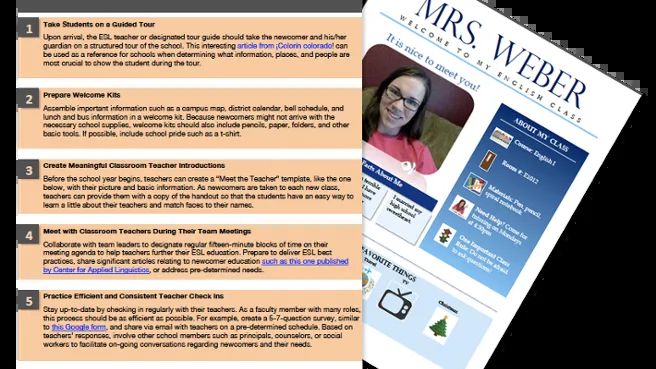Collaborating to Support ELL Newcomers


Collaborating to Support ELL Newcomers
Ask any newcomer to recount his or her first day of school, and you will find that the student is able to do so with amazing clarity and vivid detail even years after being in the US. While not the majority of English Language Learners, newcomers include the many immigrants who first enroll in US schools at the middle or high school level, often with limited English proficiency. Armed with notions of what school in America is like based on movies, music, or correspondence from relatives, most newcomers find that no amount of studying could've prepared them for this monumental leap into a strange new world.
During my seven years as a high school newcomer teacher at John B. Connally High School, I urged my students to commit to paper their first year memories as a newcomer, certain that they would appreciate reading their recollections in years to come. Time and time again students would recall with ease their shock at the vastness of their new school, their surprise when a series of bells signaled students to move from class to class instead of the teachers, or the fear that overcame them when they realized they didn't know which stop on the bus route would lead them home. I remember reading about one student who admitted that he spent the first several weeks of school saying “Yes” in response to every question or comment someone directed at him. Another student frantically Googled “Where buy thinking cap” when her teacher told everyone to bring theirs for the test!
Not only did reading my newcomers’ writing prove to be an entertaining and often emotional experience, it was also educational. Indeed, it is through their writing that I fully understood what an important impression the first day of school makes on these newcomers, and how the preparedness of staff impact their perceptions of school in the US and their initial feelings of success or failure. I realized that my own brief tour of the school and introduction to the campus principal was not the most effective way to welcome these recently arrived immigrants and their families. To better prepare these students for success, I began to work closely with classroom teachers to build a collaborative school community that strived to welcome and support these students academically, socially, and emotionally. In an effort to help others commit to collaboration, I’ve included some advice and best practices below from my experience at Connally High School.
The first day of school: Because ELL newcomers enroll throughout the school year, the first day of school can be a relative term. No doubt the majority of newcomers feel overwhelmed by a wave of new faces, new customs, and new words. While it might be tempting to provide the students with all of the important information they need, much of this information will not be absorbed, let alone understood, at the time of their arrival. Instead, information will be more memorable if explained in small chunks during the coming weeks. What students will understand and remember from their first day is that the members of the school community greeted them and their families with warmth, kindness, and respect.
Beyond the first day: Your newcomers survived their first day of school and feel excited about coming back a second day. Now what? Whether students are scheduled with a team of ESL-certified teachers or a team of teachers with varying levels of ESL training and experience, it is important to ensure that the academic and emotional support students felt on their first day continues into the classroom. As your school’s ESL expert, you serve as a rich source of knowledge and can help your school community work through some of the challenges your newcomers are likely to face.
The most effective ways to identify and teach newcomers may not always be clear, but we can all agree that any method, solution, or initiative requires collaboration among many different stakeholders in order for it to be successful and long-lasting. Committing to a school-wide effort in the support of your school’s ELL newcomers will make these students feel valued and nurtured as they take that monumental leap into this strange new world.